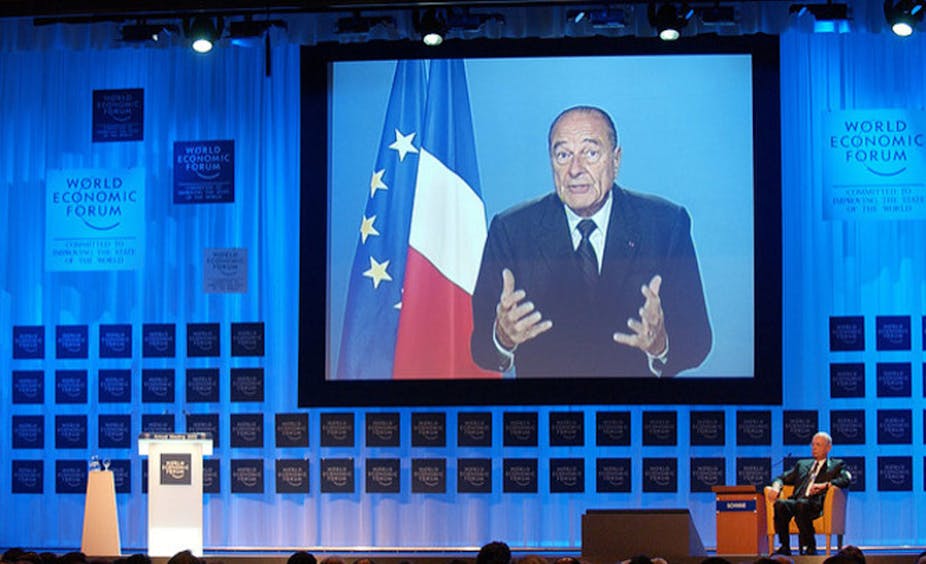Jacques Chirac, the president of France from 1995 to 2007, has died. His family announced his passing on Thursday, September 26 via Agence France Presse. “President Jacques Chirac passed away peacefully this morning surrounded by friends and family,” said Frédéric Salat-Baroux, the husband of Chirac’s daughter Claude.
His health had deteriorated since his departure from the Elysée Palace in 2007, notably as a result of a 2005 stroke suffered during his second term as president. In 2016 he was hospitalised for a lung infection but recovered.
A long civil-service career
Chirac was born in Paris in 1932, with roots in central France. He studied at Sciences Po, the Institute of Political Studies and the National School of Administration (ENA). During his time at Sciences Po, he took a sabbatical and studied for one term at Harvard University. Then came marriage to Bernadette Chodron de Courcel, descendent of an aristocratic family, and voluntary military service in Algeria.
A committed civil servant, Chirac worked tirelessly and was able to climb rapidly in the world of politics. In 1962 he joined the office of the then prime minister, Georges Pompidou, who fondly referred to Chirac as “my bulldozer”. During the 1967 parliamentary elections, he stood for election in the Corrèze region. While the office was long held by the French Communist Party, Chirac campaigned actively and against all expectations, won.
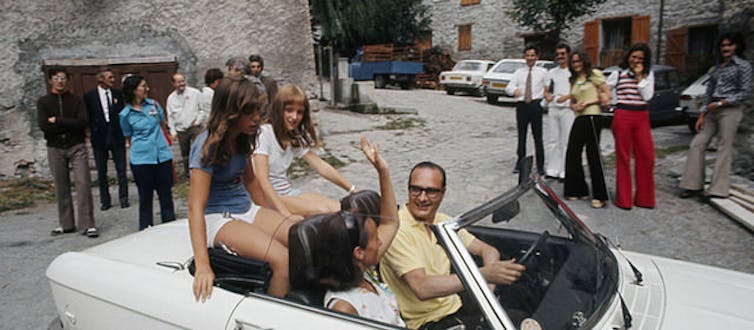
At the age of 35, Chirac was named secretary of state for employment by Pompidou, and in 1974 was named minister of the interior. During the election that followed the death of President Georges Pompidou, Chirac supported Valery Giscard d'Estaing and became prime minister when he won. In office, Chirac oversaw many of the great reforms in France of the early 1970s: reduction of the age of majority to 18, audio-visual reform, divorce by mutual consent and the legalisation of abortion, a move led by the then health minister, Simone Veil.
Over time Chirac’s relationship with Giscard d'Estaing became difficult, however, and he resigned in 1976. The following year he was elected mayor of Paris after a fierce battle, giving him a stronghold for political action. He would hold that office until 1995.
Opponent in Chief
Chirac launched his first presidential campaign in 1981, but in the first round came in behind Giscard d'Estaing, who was up for re-election. Socialist François Mitterrand won the second round, and would serve as president until 1995.
After Mitterrand’s victory, Chirac became the leader of the opposition. When the conservative RPR party won the most seats in the 1986 legislative elections, Mitterrand was obliged to chose him as prime minister, launching France’s first-ever political “cohabitation”. During this time Chirac pursued a liberal economic policy, including numerous privatisations and the abolition of a wealth tax.
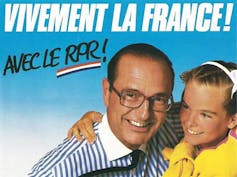
Chirac’s popularity had deteriorated sharply, however. Mitterrand was easily re-elected as president in May 1988, while Chirac earned only modest scores (19.9% in the first round and 44.0% in the second). His time as prime minister was over.
The third time, the charm
After seven years outside of national politics, Chirac’s third chance to become president came in 1995. In the first round of that year’s presidential election, Chirac was up against conservative Édouard Balladur. Despite discouraging poll numbers, Chirac managed to come out ahead – 20.8% to 18.6% – and was easily elected in the second round against Socialist Lionel Jospin. During the campaign Chirac revealed significant strength and even obstinacy in order to reach the country’s highest office.
Chirac’s first term as president was anything but easy, however. His prime minister, Alain Juppé, concentrated on budget cutting, and his attempts to reform pensions and social security were met with countrywide strikes in the fall of 1995.
With his popularity falling, Chirac made the surprise decision in April 1997 to dissolve the National Assembly, hoping to obtain a stronger majority. He lost his bet and was forced into a “cohabitation” with the Socialist Party. Lionel Jospin became prime minister, exercising considerable power during the last five years of Chirac’s first term.
Re-elected with 82% of the vote
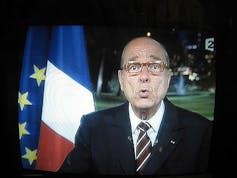
The 2002 election was a watershed for France in a number of ways. The outgoing prime minister, Lionel Jospin, was expected to make it into the second round, but was led by Jean-Marie Le Pen of the far-right National Front party, 16.9% to 16.2%. In the second round, Chirac won easily against Le Pen, 82.2% to 17.8%.
Chirac’s re-election allowed him to rebuild unity on the right side of the political spectrum, with the launch of a new political party, the Union for the Presidential Majority (UMP). As president, Chirac pushed through a range of laws, including lowering income taxes, improving road safety and measures to help the disabled. However, on the international stage his administration was most clearly distinguished by its anti-American bent. France’s refusal to take part in the 2003 military intervention in Iraq was a hugely significant moment.
Over the course of his time in office Chirac became increasingly pro-European, and hoped to see France ratify the draft European Constitution by referendum – one that would go down to defeat in 2005.
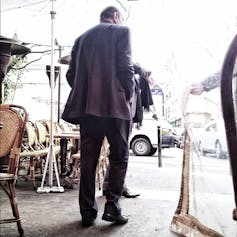
Chirac left office in 2007, and in retirement devoted himself to the prevention of international conflicts, sustainable development and the Musée du quai Branly, whose creation he spearheaded 10 years earlier. He was also part of France’s Constitutional Council until 2010.
After a life in public service, Chirac will be remembered as a man who enjoyed getting up close with the public and wasn’t shy about visiting France’s annual Salon de l'Agriculture, one of the world’s largest agricultural shows. He was also an ardent defender of France’s Republican values, and worked on the international scene to make the voice of France heard and to defend a multipolar world.


